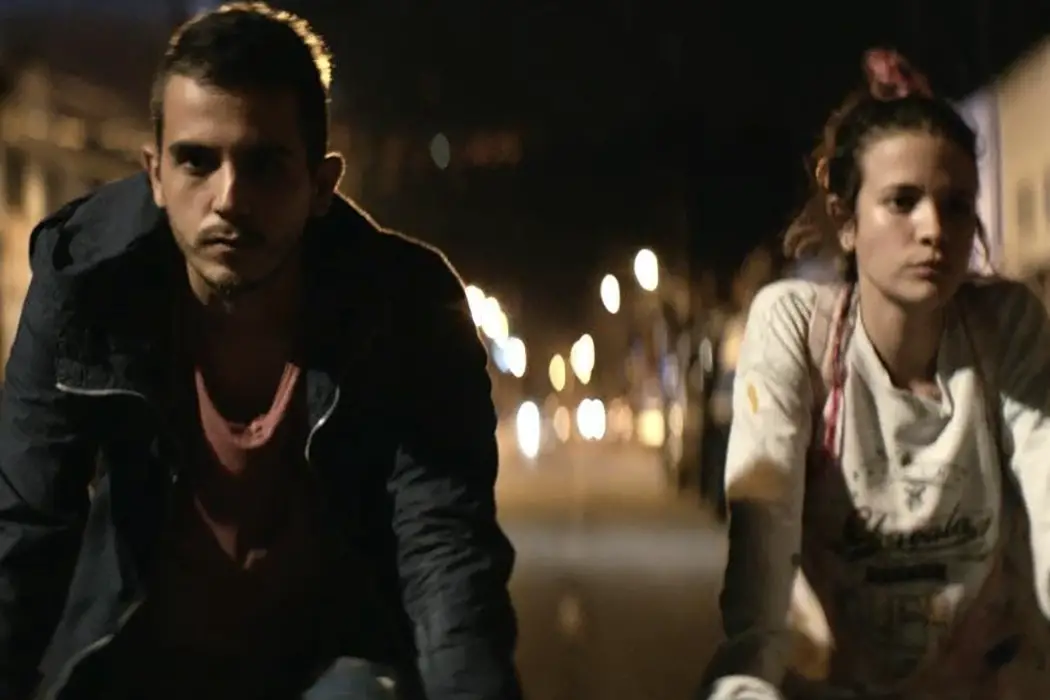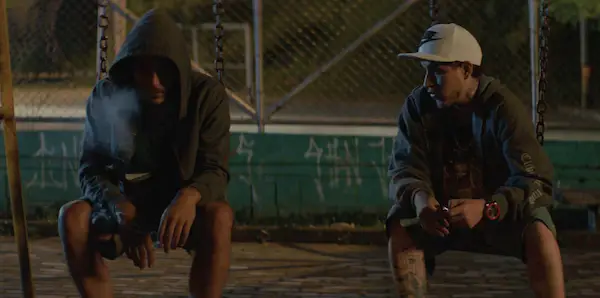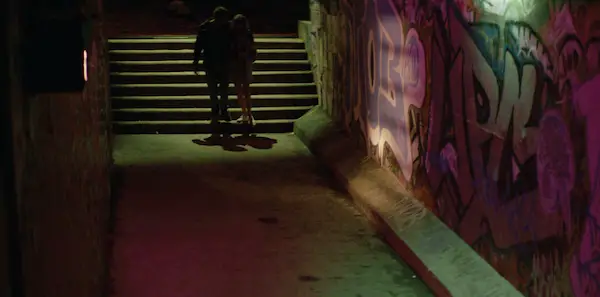DAYS OF THE WHALE: A Moving Subtle Picture With A Terrific Political Punch

22. Film Critic and Journalist. Lover of Digital and Celluloid
Days of the Whale (Los Días De La Ballena) is the feature film debut from director Catalina Arroyave. It follows two young and in love graffiti artists Cristina and Simón as they paint their way through troubled city life of Medellin in Colombia. Cristina lives with her father and stepmother, who disapprove of her lifestyle with Simón and question her about her studies at university. Meanwhile, Cristina’s mother has started a new life and has propositioned Cristina to join her and get away from the constant threat of gang violence.
Simón lives with his grandmother and finds solace only in Cristina and his artistic output in graffiti. Both soon become embroiled in their questionable circumstances in life as a gang terrorises the neighbourhood inhabitants and the local youth centre in which Simón and Cristina work. It leads them to battle against the threats of adolescence with their artistic prowess in the face of uncertainty of their relationship and future in this violent land.
A Seismic Boot of Filmmaking Skill
As directorial debuts go, Catalina Arroyaves’ Days of the Whale is absolutely solid in terms of the filmmaking and narrative on offer. It’s slick and stylish with a terrific eye, not in terms of overly abundant flair, but in a restrained manner of capturing the bubbling intoxicating lifeblood of this city and its occupants. The cinematography by David Correa Franco remains grounded, with the story taking centre stage of any vastly eccentric visuals. The edit by Juan Sebastián Quebrada is spacious but also concise. It allows the film to breathe and open itself up to the bubbling emotions to speak for themselves, without a melodramatic turn of dialogue.
The result is a stoic albeit profound character study of two teenagers who are beginning to understand or even comprehend the limitations and expectations of their lives. Via handheld and close-up usage of the camera, you’re thrown into this tight proximity and ultimately the world of Christina and Simon that is on an emotionally deliberating edge, concerning social and fraternal matters that boil in a resonating reverberating deportment.

The performances, in particular, echo the above sentiment due to how personified and personalised these characters are. The film isn’t exactly heavy-handed on a verbal front; therefore, while as good as the screenplay from writer/director Catalina Arroyave is, it’s more of a visually stoic and restrained form of performance that excels here from actor and actress David Escallón Orrego and Laura Isabel Tobón Ochoa, as Simón and Cristina, respectively. Both Escallón and Tobón bring a fabulous raw approach to their performances that feels both compelling and captivating. Because it’s so inexperienced and fresh, there’s an organic disposition boiling away in these two rather naive but strong-headed individuals who are – depending on your reading – empowered or blinded by their desires. The resulting relationship is conveyed in a level of honest hostility and authentic naturalism that feels reflective of young love.
An Engaging Underlying of Metaphorical Meaning
The art direction and soundtrack are two very small but integral aspects of this production that are fantastic. The former, by Art Director Tatiana Vera, is ever so subtle, but an element that really protrudes this picture into a welcoming warmth. Even with the context of the plot and the gangland narrative, the image and art direction courtesy of the production is incredibly inviting for an audience. The abstract art utilised by the main characters will be no doubt be determined by the viewer – presumably due to their age – but that been said it’s difficult to argue against such a vivid palette on offer. The art itself is almost this silent third party character that speaks for itself in a manner of expression. The score by Víctor Acevedo arguably is the best description of this entire picture. It’s a subtle voice of calm, soothing assonance that acts as a provider of stability.

There’s also a wonderfully obscure deeper meaning of the title in this with the appearance of whales in and around the city in different abstract manners in the art or the animal itself. The film doesn’t hide this, so it’s not necessarily a subtle aspect that the film is flaunting in a pretentious manner. It’s conveyed much in the same demeanour as Denis Villeneuve’s Enemy, where this object/animal is visually key to the film but never solely depended upon. It’s a small visually abstract inclusion that derives meaning and discussion.
From a filmmaking standpoint, it’s actually genius concerning multiple repeatable viewings. It also gives the film more depth and significant weight upon the characters. It’s clearly a visual metaphor for these characters who are ultimately beached in this land that’s hindering them, especially in the arc of Cristina. Although I wouldn’t count out any derived meaning that you yourself may conjure up after a viewing.
Days of the Whale: Conclusion
Catalina Arroyave‘s feature is a wonderfully engaging and weighted debut. It holds a terrific ideal of the parameters of young love and the infatuation of the present and not the future. The thematic arcs of Arroyave‘s film offers plenty of depth and layers, while also touching on political societal issues that plague Medellin. For a feature debut, Days of the Whale is a ballsy and strong independent vision for a filmmaker that is just starting out in her craft, and if it is any sign that these are just a few elements in store, Arroyave is most definitely one to watch.
What are your thoughts on Days of the Whale?
Days of the Whale had its world premiere on the 10th March at the South by Southwest Film Festival.
Does content like this matter to you?
Become a Member and support film journalism. Unlock access to all of Film Inquiry`s great articles. Join a community of like-minded readers who are passionate about cinema - get access to our private members Network, give back to independent filmmakers, and more.













